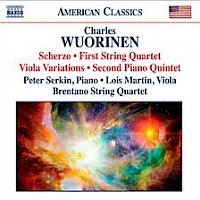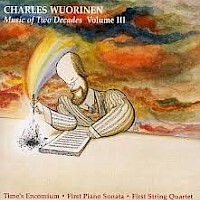First String Quartet
- Instrumentation
- 2Vn,Va,Vc (4 scores needed for performance)
- Year
- 1971
- Duration
- 21:45
- Composed
- 8/6/1970 - 1/21/1971
- Commission
- Fine Arts Quartet, Mr. and Mrs. Lee A. Freeman
My First String Quartet was commissioned for the Fine Arts Quartet by Mr. and Mrs. Lee A. Freeman, and first performed an 11 October 1971. I had finished the work in January previous, having spent most of the latter part of 1970 working on it.
The Quartet reflects fundamental concerns I had at the time with questions of large scale form, in particular the issue of an appropriately developmental–or "directed"–structure suited to a non-tonal environment. I had already long before 1970 become impatient with the directionlessness of much new music, and wanted to establish formal procedures that would allow local flexibility while solidly undergirding a musical progress analogous to the very powerfully directed structures of tonality.
My solution, too technical to detail here, involves the nesting of self-similar musical shapes on several scales of size. This is a universal feature of music, but more significantly, of the natural world itself. Employing formal and expressive methods based on this principle, then, enabled me to retain a kind of flexibility and spontaneity in the small while still clearly directing the composi¬tion toward its final goal in the last measures.
As a result of these concerns the piece emerges as a single continuity, even though it is divided into three movements. These movements have somewhat distinct characters, and are in principle similar to a traditional fast-flow-fast scheme. But equally important, and equally traditional, is the fact that each of the four instruments is an independent contrapuntal strand–and, indeed, each instrument has its own individuated version of the large formal structure I have described, and its own harmonic material. From an expressive point of view, however, the work forms a unitary utterance, for no matter how complex the detail, if music in the most general sense doesn't finally converge on a single overarching impulse, its effect will not be strong.
-CW
"Without recourse to secondhand romantic mannerisms, Wuorinen creates a rhetorical vocabulary all his own. It is founded on the interplay, understated at first and gradually intensifying, of regular rhythmic periodicity and timeless, suspended lyricism ... The music is hectically expressive, even expressionistic, in tone. At one moment it rears up in a gesture of vehement oratory, at another it sings a song of far-off beauty, and then again it pounds away ... And as the argument unfolds, so the implicit accents gradually emerge and converge in a concluding processional of potent tragic force." Bernard Jacobson, Chicago Daily News


